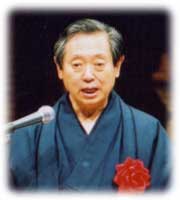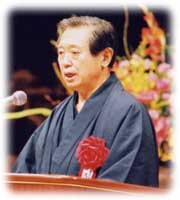Speech by Mr. Makoto Ooka(Japan) (Poet)
Speech by Mr. Makoto Ooka(Japan)
(Poet)
 This year marks the 30th anniversary of the Japan Foundation, making it a felicitous year indeed. I wish to express my heartfelt gratitude for being so unexpectedly chosen as a recipient of the prestigious Japan Foundation Award. And I feel with great intensity the enormous responsibility that comes along with this honor.
This year marks the 30th anniversary of the Japan Foundation, making it a felicitous year indeed. I wish to express my heartfelt gratitude for being so unexpectedly chosen as a recipient of the prestigious Japan Foundation Award. And I feel with great intensity the enormous responsibility that comes along with this honor.
On several occasions, I have received the support of the Japan Foundation when I have made work-related trips abroad. This is something that I have in common with a large number of people, and I have felt a renewed sense of warm gratitude for my relationship with the Foundation upon repeated occasions, one element of which is my involvement with the Foundation periodical Kokusai Koryu.
I have often been invited to have significant discussions with poets from various foreign countries or to be their partner in exchanges of letters, and I have also written a number of essays for this publication. My long essay "Japanese Living in a Circle Society" was translated into English, French, and Spanish, and published in a Foundation magazine targeted toward overseas readers. The responses I received as a result made this an essay to be remembered for me.
But I think that my receiving of the Japan Foundation Award at this time is the result of recognition, from the viewpoint of international exchange, of my nearly twenty-year quest for carrying out "linked-verse" or renshi, collaborations with overseas poets.
The specified creative group production activity that I call "linked- verse" is likely unfamiliar to the ears of most people. So to explain briefly, it is a style of mutual creativity that finds its roots in the basic principle of ancient Japanese poetry writing for the group production of poems called renga or renku that I have applied to contemporary poetry.
This system of mine attracted the attention of overseas poets and researchers with an interest in contemporary Japanese poetry; as a result of which, in a very short time, I began receiving invitations to try out my "linked-verse" system with poets in Europe and America. And it has been a source of surprise to me that the poets in a number of European countries have even begun to use my Japanese term renshi, transliterated directly into their languages.
 This demonstrates that poets from all parts of Japan, Europe, America, and Asia have recognized that the system of joint poetry composition is both interesting and possible, if only there is a mutual will to cooperate, and something that they have a desire to try out in concrete terms.
This demonstrates that poets from all parts of Japan, Europe, America, and Asia have recognized that the system of joint poetry composition is both interesting and possible, if only there is a mutual will to cooperate, and something that they have a desire to try out in concrete terms.
It is through experiments with this system that I have enjoyed several days of meetings, talks, and meals with poets of countries that I had never so much as heard of before, by means of which extremely intimate relationships are formed instantly when placed in the center the world of poetry, which is unfamiliar to the majority of people.
I constantly recall a number of deeply interesting examples of this effect when I look back over the twenty-year history of my international renshi meetings throughout the world.
It was thanks to the presence of a number of people in organizations that have a concrete history of international activities who comprehended and actively supported this nebulous project of mine called renshi that I have succeeded in bringing it to reality with no particularly great effort on my part, in spite of the fact that, in a certain sense, it demands large-scale preparations.
I will not mention names at this time, but I do wish to point out here that is was thanks to both the poets and translators who participated in each of my renshi meetings, as well as all the people who lent support toward its success that renshi has become a meaningful project. I wish to take this opportunity to express my deepest gratitude to all of these people from the bottom of my heart.
Thank you very much.
- What We Do Top
- Arts and Cultural Exchange [Culture]
- Japanese-Language Education Overseas [Language]
- Japanese-Language Education Overseas [Language] Top
- Learn Japanese-language
- Teach Japanese-language
- Take Japanese-Language Test
- Know about Japanese-language education abroad
- The Japanese-Language Institute, Urawa
- The Japanese-Language Institute, Kansai
- Japanese-Language Programs for Foreign Specified Skilled Worker Candidates
- Japanese Language Education for Japanese Children Resident Overseas and for the Descendants of Migrants
- Archives
- Japanese Studies and Global Partnerships [Dialogue]
- JF digital collection
- Other Programs / Programs to Commemorate Exchange Year
- Awards and Prizes
- Publications
